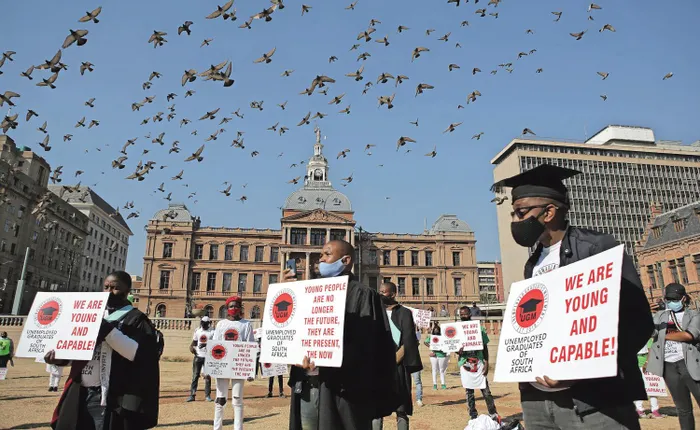
Graduate unemployment also remains a concern. Uasa has called for practical solutions to address South Africa’s youth unemployment crisis, urging the government to include young voices in high-level decision-making.
Image: Phill Magakoe AFP
AS South Africa commemorates Youth Month under the theme “Skills for the changing world – empowering youth for meaningful economic participation”, two pressing issues demand urgent attention: the exclusion of young people from critical policy discussions and the systemic neglect of early childhood development (ECD), which experts warn perpetuates cycles of poverty and unemployment.
Trade union Uasa has called for practical solutions to address South Africa’s youth unemployment crisis, urging the government to include young voices in high-level decision-making. Uasa spokesperson Abigail Moyo welcomed President Cyril Ramaphosa’s initiative to convene a national dialogue through an Eminent Persons Group, but cautioned that excluding unemployed youth risks rendering discussions “out of touch with reality”.
“While the Eminent Persons Group comprises notable leaders who have made significant contributions to society and the economy, where are the young people who face the daily challenges of unemployment and inequality?” Moyo asked pointedly. “We want to see young unemployed youth contributing to these dialogues, sharing their innovative ideas to help shape our future, the same way the youth of 1976 fought the apartheid system.”
With youth unemployment exceeding 45%, Moyo stressed that the current generation must be given the same opportunities as the 1976 youth to drive change. “We acknowledge the contributions made by the youth of 1976 in ending apartheid and shaping democracy. This is why we need the current generation on such platforms; it is time for them to lead and be part of the solutions for the next generation.”
She called for a dedicated forum where graduates, job seekers, and young entrepreneurs can engage directly with policymakers. “While experience and wisdom are important, proactive solutions come from those living the daily realities of unemployment. Young people must be involved in policymaking where their perspectives are heard at the highest level.”
Moyo also urged broader societal collaboration, saying: “It is everyone’s responsibility to shape an inclusive future with sufficient support.” As Youth Day approaches, Uasa extended solidarity to young South Africans, with Moyo affirming: “Their voices matter, and their energy must be harnessed to build a better future.”
While youth unemployment dominates headlines, experts cautioned that South Africa was failing its youngest citizens long before they enter the job market. Deb Zelezniak, chief executive of the Santa Shoebox Project, highlighted that more than 1.3 million children lacked access to early childhood development (ECD) programmes — a critical missed opportunity to break the poverty cycle.
Though the government has allocated R10 billion to ECD — increasing daily subsidies from R17 to R24 per child and expanding access to 700 000 more children — Zelezniak argued this remains insufficient. “The current R24 per child per day cannot cover the full cost of a quality ECD programme, estimated at at least R36,” she said. “This won’t meet the Department of Basic Education’s goal of universal ECD access by 2030.”
The consequences are dire. “Children with quality early education perform better in school, are less likely to engage in crime, and more likely to find employment,” Zelezniak said. “Every Rand invested in ECD yields R7 in social and economic returns through improved education, reduced inequality, and a stronger economy.”
Without intervention, she warned that today’s excluded children risk becoming a lost generation. “ECD is more than childcare — it’s economic justice. The gaps between children with and without early support only widen over time.”
As Youth Day approaches, these intersecting challenges underscore the need for systemic reform. From ensuring youth inclusion in policy dialogues to investing in early childhood development, South Africa’s future hinges on addressing both immediate unemployment and the root causes of inequality.
The question remains: Will those in power listen before it’s too late?